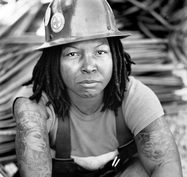 Last year, Fifth Harmony topped the charts with “Work from Home,” a song with the chorus “work work work work work work work [indecipherable] work work work work work work work.” This is not to be confused with Rihanna’s single “Work,” whose chorus goes “work work work work work work, [indecipherable] work work work work work work.” Similarly, the difference between Democrats and Republicans is relatively minor when it comes to the issue of work. Both sides agree that people should work, and that they should be remunerated for their labor. In this post, we’ll talk about one difference: different caricatures that feature prominently in the political imaginations of the two parties. The best way to get at this is through an imaginary scenario. Let’s imagine a country in which everyone has their most basic needs met, that is, people have food and shelter and so on. In this country, free market economics operates in such a way that some people earn more than others for their labor, based on supply and demand, but a person’s income is indexed to some extent to the work they do. There are two people in this country, however, who receive money but don’t do any work.
One of them is named Guy Lazy. Guy is a freeloader, and has figured out a way to exploit the governmental safety net and the charitable donations of strangers to get money without contributing anything. Guy takes money and resources from the system and does not give anything back. There is nothing preventing Guy from working to earn his living besides his own lack of motivation and his desire to play video games all day. Also in this country is a man named Rich Capital. Rich inherited millions of dollars and immediately entrusted this money to the competent businesspeople who run Capital Industries. Rich has literally never worked a day in his life, but makes lots of money because he owns the majority share in Capital Industries, a company with thousands of hard-working employees. He certainly could work, but spends most of his time playing golf instead. In this fictional country, we have two different people who could work but choose not to, while nonetheless still making money they have not earned. These two caricatures feature when Republicans and Democrats, respectively, think morally about economics. Republicans worry about people like Guy Lazy who take and take without giving anything back to the system. Democrats worry about people like Rich Capital who exploit the system to get even richer because of others' labor. Both parties agree that people should earn their income by putting in work, but they tend to fixate on different groups of people who flaunt this principle. Now, finding the similarities and dissimilarities between these fictional characters and the reality of the U.S. makes for an interesting conversation. Some will object that very few people like Guy Lazy actually exist; in present-day America the beneficiaries from social services typically do not have the opportunity to work to support themselves, often as a result of systemic injustice. Others will object that very few people like Rich Capital exist, or perhaps that people in Rich’s position do in fact earn their income because investing is a type of work. These points are only the tip of the iceberg when it comes to analyzing the complex economic realities of America. Rather than summarize that conversation here, I’ll conclude with three observations. First, when people object to “capitalism” they are not necessarily objecting to the principle that people ought to earn their income. In fact, criticisms of capitalism are often rooted precisely in that principle, calling into question the exorbitant incomes of business owners, investors, and developers. The fact that Rich can make money at rates vastly disproportionate to the work he puts in, simply because he possesses capital, is something that can be objected to according to the same moral logic by which people object to Guy’s freeloading. American economic disputes are not the result of two radically incommensurable worldviews. Second, when people object to behavior like Guy’s, they’ve often relied on rhetoric with racial overtones. This is a problem, but the moral commitment at the root of the objection cannot simply be dismissed on those grounds. It is not racist to object to Guy’s behavior, only to ignore the social and historical factors that limit certain groups’ opportunities, or to generalize that many people in Guy’s ethnic group act this way and do so out of a moral deficiency. Third, we do not live in the imaginary country I described. Many families, including those working as hard as they can, do not have their most basic needs met. It helps no one to merely reiterate the uncontroversial principle that people ought to earn their livelihood. We need instead to pay attention to the factors that make it possible for some to thrive without working and others to work without thriving. by Russell Johnson
1 Comment
10/6/2022 02:00:41 pm
What an exquisite article! Your post is beneficial right now. Thank you for sharing this informative one. If you're looking for a money-making app, download this link https://bit.ly/3MSDRA9
Reply
Leave a Reply. |
Archives
September 2020
Categories
All
|
 RSS Feed
RSS Feed